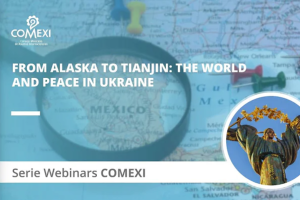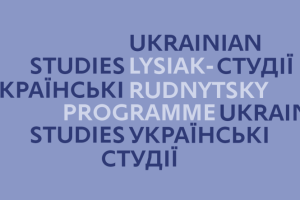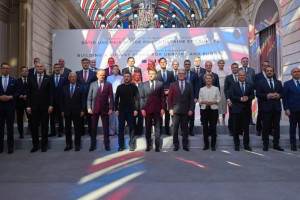The Struggle for Ukraine: Progress Post-Euromaidan and Challenges in 2019
This expert roundtable was organised in partnership with Chatham House in London.
In 2019, Ukraine’s political life will be dominated by presidential and parliamentary elections (end of March and in the autumn). What these votes will mean for the future of the country was one of the main topics of a roundtable hosted by the Clingendael Institute and co-organised with Chatham House, the British Royal Institute of International Affairs. Researchers from Ukraine, the UK and the Netherlands offered their analysis and discussed a recent Chatham House report.
Programme
13:30: Welcome and registration
14:00 - 15:30: 'Security and Conflict with Russia'
Panel experts: Hanna Shelest (Editor-in-Chief Ukraine Analytica), James Nixey (Head of the Russia and Eurasia Programme at Chatham House), and Tony van der Togt (Associate Senior Research Fellow at the Clingendael Institute).
Moderator: Rem Korteweg (Senior Research Fellow at the Clingendael Institute).
15:30 - 16:00: Break
16:00 - 17:30: 'Ukraine's upcoming elections'
Panel experts: Olexiy Haran (Professor of Political Science at National University of Kyiv-Mohyla Academy, and Research Director at Democratic Initiatives Foundation), and Janet Gunn (Independent Analyst).
Moderator: Jan Marinus Wiersma (Senior Visiting Fellow at the Clingendael Institute).
17:30 - 18:30: Closing drinks
13:30: Welcome and registration
14:00 - 15:30: 'Security and Conflict with Russia'
Panel experts: Hanna Shelest (Editor-in-Chief Ukraine Analytica), James Nixey (Head of the Russia and Eurasia Programme at Chatham House), and Tony van der Togt (Associate Senior Research Fellow at the Clingendael Institute).
Moderator: Rem Korteweg (Senior Research Fellow at the Clingendael Institute).
15:30 - 16:00: Break
16:00 - 17:30: 'Ukraine's upcoming elections'
Panel experts: Olexiy Haran (Professor of Political Science at National University of Kyiv-Mohyla Academy, and Research Director at Democratic Initiatives Foundation), and Janet Gunn (Independent Analyst).
Moderator: Jan Marinus Wiersma (Senior Visiting Fellow at the Clingendael Institute).
17:30 - 18:30: Closing drinks
Short impression of discussion:
In 2019, Ukraine’s political life will be dominated by presidential and parliamentary elections (end of March and in the autumn). What these votes will mean for the future of the country was one of the main topics of a roundtable hosted by the Clingendael Institute and co-organised with Chatham House, the British Royal Institute of International Affairs. Researchers from Ukraine, the UK and the Netherlands offered their analysis.
Relations with Russia and the ongoing conflict in Eastern Ukraine remain high on the national political agenda, but given Moscow’s intransigence improvements of the situation cannot be expected anytime soon. Russia has a keen interest to keep a foot between the door in the neighbouring country. The recent crisis in the Sea of Azov shows that Russia has shifted its focus to unoccupied parts of Ukraine. Ukraine’s sovereignty remains under threat, skirmishes continue around the line of contact, and the Minsk process is not yet delivering the desired results. The EU and the US will uphold the sanctions but initiatives to break the deadlock are not to be expected.
Regarding Ukraine’s domestic politics, the upcoming elections will not change the pro-European orientation of the country. Parties with links to Moscow lack popular support. The two main contenders for the presidency are Julia Timoshenko and Petro Poroshenko. If elected, neither of them would drastically change the course of the country. Yet they have different agendas: the former has somewhat populist social economic demands, the latter rouses the nationalist vote with slogans like “Faith! Army! Language!”. Both cannot be considered true reformers and both are linked to oligarchic groups. It is hard to foresee what will drive the choice of the voter: bread and butter issues, corruption or national (identity) questions? Whether the next president will be able to establish a presidential majority after the parliamentary elections, is unclear becausecurrently none of the major parties is expected to get more than 20% of the vote, and the number of undecideds is high. Whether the eventual coalition will be reform-oriented, is an open question, though many positive steps towards reform have been taken in recent years.
As regards the role of the EU, the conclusion was that Brussels should look at its own role again and decide how it could have more impact on the reform process in Ukraine. It appears to have lost leverage with the political elites after having signed association agreements and introduced visa freedom with nothing else on offer in the foreseeable future. Finally, the struggle for Ukraine is a test of wills between Russia - which sees Ukraine in terms of a vital national interest - and the EU. Europe must remain committed, if Ukraine’s ability to chart an independent course is to have a chance.








